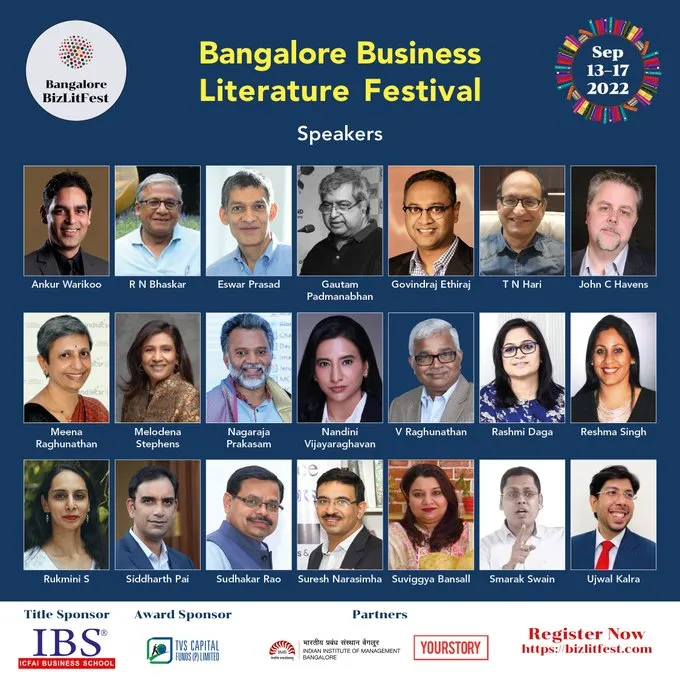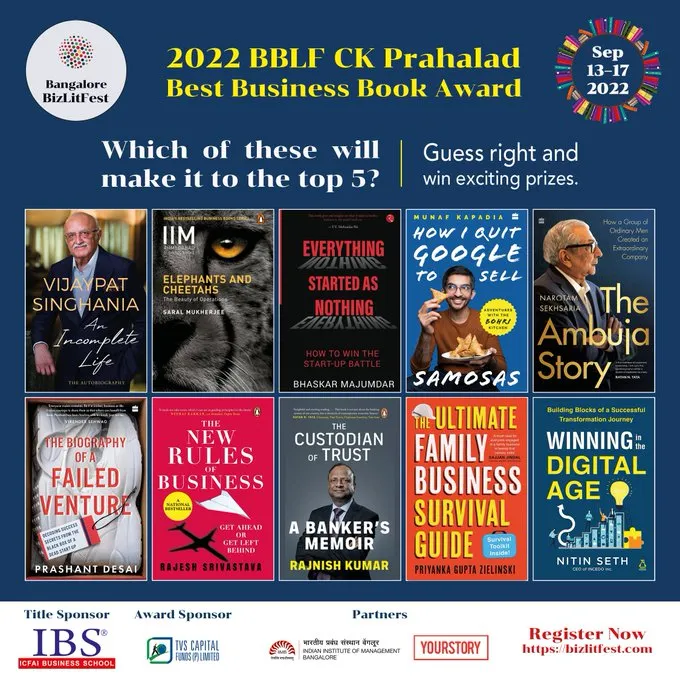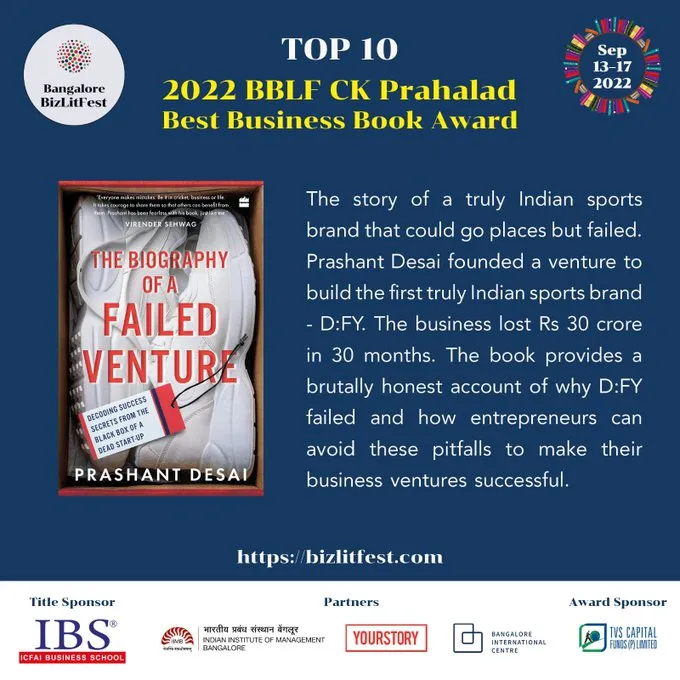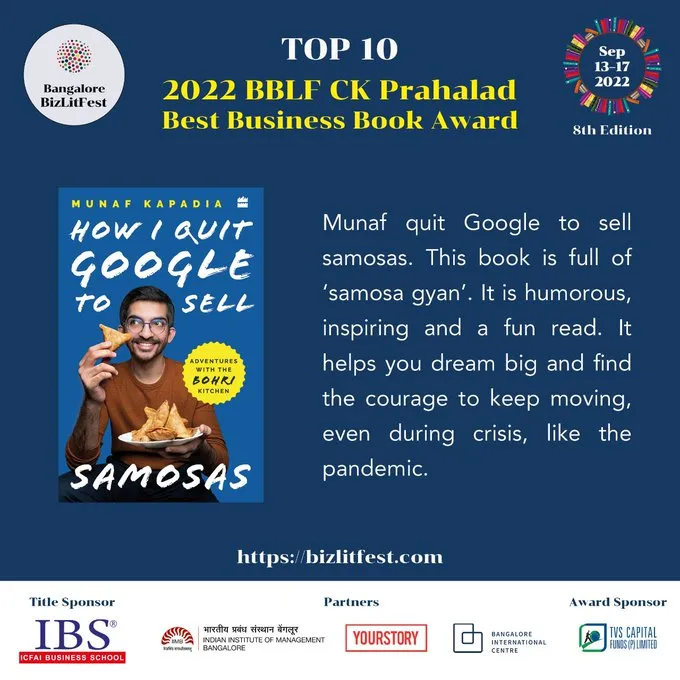Suresh Narasimha of Cocreate Ventures on why entrepreneurship support for students is key for the nation
Investor-entrepreneur Suresh Narasimha is speaking at the upcoming Bangalore Business Literature Festival. This preview article rounds up his insights on student startups.
Suresh Narasimha is Managing Partner of idea-stage fund CoCreate Ventures, with a primary focus on campus entrepreneurs. He is also speaking at the Bangalore Business Literature Festival (BBLF) 2022 this week, for which YourStory is the media partner.
See our earlier annual articles on BBLF from the 2015 edition onwards here, and our compilation of 85 Quotes on World Book Day. See also YourStory’s Book Review section with takeaways from over 340 titles on creativity, entrepreneurship, innovation, social enterprise, and digital transformation.
Suresh is a technology and consumer-focused entrepreneur and investor with over 15 years of experience. CoCreate Ventures has helped launch more than 28 student startups in the past year. Many are in the revenue ramp-up stage, and have women as co-founders as well.
Suresh’s track record in the tech startup space includes TELiBrahma, Sensara and monkeybox, and consumer brands like JustBooks and Bonhomia. He has more than 15 patents from USPTO, and is also a keen student of Indian aesthetics.
He joins us in this wide-ranging interview on startup metrics, profitability, resilience, ecosystems, and youth involvement.
Edited excerpts below:

YourStory [YS]: What can be done to make India's startup ecosystem more favorable for innovation and scale?
Suresh Narasimha [SN]: This topic is very close to my heart and I believe the best thing for India is to empower bright students to take up entrepreneurship and encourage students to understand how entrepreneurship is the best thing while they are still on campus.
This is the single most important thing that we need for the ecosystem, which is facing a lot of challenges in terms of talent, innovation, and where there is a lot more funding, which is in few companies in the marketing area.
The ecosystem should nurture a lot more students, and then create a tight focus on the student and the project. In the current highly-competitive landscape of startups and numerous ideas, students have the potential to build great companies, as they come with fresh ideas, innovative thinking, and bring the determination to solve issues and have an impact on a large scale.
Focusing on the student segment is the only way to get away with the challenges of the talent issue that we are currently facing.
YS: How did Indian startups fare during the pandemic? What are some notable success stories you have come across?
SN: Having been thick in the game of startups during the pandemic definitely brought out interesting learnings. At Cocreate, we could see a lot of startups from students in SaaS and some other interesting technology areas like Web3, IoT, AI and ML.
I was excited to see some other amazing Web3 companies, which are as good as the quality that you find elsewhere in the world. It was quite encouraging to witness a lot of these startups learn how to build a product remotely, launch the product on the web, and build the startup ground up.
Most importantly, what was heartening for me was to see a lot of students get time from their academics to build their own startups during the pandemic. In the past one and a half years, we also funded around 28 startups by students, and these startups could raise $200,000 right at the idea stage and have the potential to raise another $1.5 to $2 million.
Students got the opportunity to discover new problems, challenges, and how to solve them. They got time to think about their idea, research, and build a solution. We believe this trend will continue.
We witnessed some interesting success stories as startups from these innovative students. For example, there is an amazing company called Fond that is building smart wearables for pets. There is a company called greenifly, building drone solutions for farmers to predict their yield, identify diseases that are still in early stage, and also do some precision agriculture.
There were innovations even in spaces like crypto and digital media. A company called Zeru is building zero collateral-based cryptocurrency. The startup Data Nominee is doing some very interesting work around digital assets.
From the 28 companies that we invested in, around 16 are already getting initial customer traction, which is quite encouraging for us.

YS: What are some books on your reading list these days?
SN: I am currently re-reading a lot of classics. I am at the moment really immersed in the original Arthashastra as a part of a study circle. I am also reading the whole of SL Bhyrappa in Kannada and Kumara Vyasa Bharata. I have also gone back to reading Paulo Coelho.
YS: What are the best ways to engage with founders for mentoring/coaching? At what stage in the startup journey are they most open to advice?
SN: I think it's a myth that there are different stages in which founders listen. Founders listen to people who are on their level or similar wavelength, and that could keep changing and evolving.
What we should actually question is, as advisors, do we have enough commitment for those startups? This needs conviction and capability and not just generic gyaan. Most founders will start hating generic gyaan.
Founders want specific inputs, whether it's technology, products, marketing, or funding. They want to talk to people who can give them relevant, specific inputs at that point of time.
There is enough generic material available on the web that they can keep going back to on the challenges of entrepreneurship, how to write the pitch deck, and so on. They will listen to mentors who can give them specific and clear answers.
I also believe mentors who don't have skin in the game with startups like not having invested in the ecosystem or experienced it, would find it very hard to justify their value – of course, with some exceptions. I think the mentors who can very confidently say ‘This is what has worked’ and ‘This doesn't work’, based on their experiences will be a lot more respected and revered.

YS: Value or valuation, growth or profitability - these are questions that often challenge founders. What's the best way to address these tradeoffs?
SN: I think we need to understand one thing, all businesses will have some value and valuation. It's just a question of at what scale do the founders want to optimise their profitability?
That I feel is a question of whether traction is visible. Traction could be in terms of revenue or user metrics, for investors and entrepreneurs. If we think I have enough confidence that my metrics will help me monetise greatly one day, then I will continue to focus on it. It also depends on the risk appetite of investors.
But the key thing is, do you have the traction? Are there the right metrics of users, engagement, revenue or profitability? You need to have clarity in terms of your long journey.
When will you start making actual money? It could be up to one year or five years but you need to know how exactly you can do it. Then you should have the capability to convince the right guys to back you up.

YS: What are your words of advice or tips for aspiring founders in our audience?
SN: It is always a great time to start up, and my suggestion would be to go for it.
Don't think of jugaad startups. Instead, think deep, solve complex problems, and build amazing businesses that consumers love. Start really getting serious because there are enough opportunities to build the real deal here.
YS: Any other parting comments?
SN: I really want media and events like this to help students become entrepreneurs. Come chat with them, help them, mentor them, partner with them and become their co-founders.
It's an amazing journey and an amazing experience. And I'm 100 percent sure that it's a much better return in working with student entrepreneurs!
(The article has been edited to reflect an update in the bio provided by Cocreate Ventures)
Edited by Teja Lele



![[Year in Review 2021] How women entrepreneurs pivoted during the pandemic and saw tangible results](https://images.yourstory.com/cs/4/8e7cc4102d6c11e9aa979329348d4c3e/Cover-05-1639653048479.png?fm=png&auto=format&h=100&w=100&crop=entropy&fit=crop)
![[Year in Review 2021] 10 inspiring stories of people who made the world a better place](https://images.yourstory.com/cs/5/a09f22505c6411ea9c48a10bad99c62f/Imageha73-1640855877602.jpg?fm=png&auto=format&h=100&w=100&crop=entropy&fit=crop)
![[Year in Review 2021] Times are changing as women in tech reach new heights](https://images.yourstory.com/cs/4/bf6cd6001f6d11ec9f7c8d775ba8e1d7/women-tech-leader-1640501582312.png?fm=png&auto=format&h=100&w=100&crop=entropy&fit=crop)





